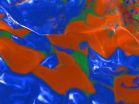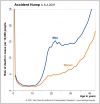(Press-News.org) Washington, DC (August 18, 2011) — High blood phosphate levels can set chronic kidney disease (CKD) patients on a rapid path to kidney failure, according to a study appearing in an upcoming issue of the Journal of the American Society Nephrology (JASN). To make matters worse, phosphate appears to interfere with the effectiveness of important kidney medications.
The kidneys of patients with CKD cannot efficiently get rid of wastes such as excess phosphate in the blood. As a result, the kidneys become overloaded with phosphate. Carmine Zoccali, MD (CNR-IBIM, Clinical Epidemiology and Physiopathology of Renal Diseases and Hypertension of Reggio Calabria, Italy) and his colleagues wondered how this phosphate overload affects the kidneys of patients with CKD. They also wondered whether phosphate overload alters the effects of ramipril, a drug prescribed to slow the progression of kidney disease. (The use of ramipril and other drugs in its class represents the current standard of care for patients with CKD.)
The researchers studied health information from 331 CKD patients, dividing patients into four groups based on their phosphate levels.
Among the major findings:
Even though their blood phosphate was still normal or near normal, patients in the two highest phosphate groups progressed more quickly to serious kidney dysfunction or kidney failure than patients with lower phosphate levels.
Higher phosphate levels blunted ramipril's benefits.
These results suggest that phosphate levels can predict which CKD patients are in serious trouble of developing kidney failure. They also show that high phosphate levels block the beneficial effects of important kidney medications.
Future studies should test whether reducing phosphate improves kidney health and optimizes patients' medications. "Our study opens the exciting possibility that reducing phosphate, either by diet or drug treatment, may enhance CKD patients' response to certain drugs," said Dr. Zoccali. "If our findings are replicated in a new clinical trial, interventions aimed at reducing phosphate will be a relevant step forward in the fight against these dangerous kidney diseases," he added.
###
Study co-authors include Piero Ruggenenti, MD, Annalisa Perna, Giuseppe Remuzzi, MD, FRCP (Mario Negri Institute for Pharmacological Research, in Bergamo, Italy); Daniela Leonardis, MD, Rocco Tripepi, Giovanni Tripepi, and Francesca Mallamaci, MD (CNR-IBIM, Clinical Epidemiology and Physiopathology of Renal Diseases and Hypertension of Reggio Calabria, Italy); for the REIN Study Group.
Disclosures: The authors reported no financial disclosures.
The article, entitled "Phosphate May Promote CKD Progression and Attenuate Renoprotective Effect of ACE Inhibition," will appear online at http://jasn.asnjournals.org/ doi 10.1681/ASN.2011020175.
The content of this article does not reflect the views or opinions of The American Society of Nephrology (ASN). Responsibility for the information and views expressed therein lies entirely with the author(s). ASN does not offer medical advice. All content in ASN publications is for informational purposes only, and is not intended to cover all possible uses, directions, precautions, drug interactions, or adverse effects. This content should not be used during a medical emergency or for the diagnosis or treatment of any medical condition. Please consult your doctor or other qualified health care provider if you have any questions about a medical condition, or before taking any drug, changing your diet or commencing or discontinuing any course of treatment. Do not ignore or delay obtaining professional medical advice because of information accessed through ASN. Call 911 or your doctor for all medical emergencies.
Founded in 1966, and with more than 12,000 members, the American Society of Nephrology (ASN) leads the fight against kidney disease by educating health professionals, sharing new knowledge, advancing research, and advocating the highest quality care for patients.
Kidney drugs hampered by high blood phosphate
Lowering phosphate levels could help prevent kidney failure
2011-08-19
ELSE PRESS RELEASES FROM THIS DATE:
New 'bionic' leg gives amputees a natural gait
2011-08-19
A new lower-limb prosthetic developed at Vanderbilt University allows amputees to walk without the leg-dragging gait characteristic of conventional artificial legs.
The device uses the latest advances in computer, sensor, electric motor and battery technology to give it bionic capabilities: It is the first prosthetic with powered knee and ankle joints that operate in unison. It comes equipped with sensors that monitor its user's motion. It has microprocessors programmed to use this data to predict what the person is trying to do and operate the device in ways that facilitate ...
Robust preschool experience offers lasting effects on language and literacy
2011-08-19
Preschool teachers' use of sophisticated vocabulary and analytic talk about books combined with early support for literacy in the home can predict fourth-grade reading comprehension and word recognition, new research from Vanderbilt University's Peabody College finds.
The findings, published in Child Development and included in a review article in the August 19, 2011 edition of Science, present evidence that there are lasting, complex and mutually reinforcing effects that flow from strong early childhood classrooms.
"We need to take very seriously the importance ...
Parents misled by advocates of single-sex education
2011-08-19
There is no scientific basis for teaching boys and girls separately, according to Lise Eliot from The Chicago Medical School. Her review reveals fundamental flaws in the arguments put forward by proponents of single-sex schools to justify the need of teaching teach boys and girls separately. Eliot shows that neuroscience has identified few reliable differences between boys' and girls' brains relevant to learning or education. Her work is published online in Springer's journal Sex Roles.
The first issue Eliot highlights is that single-sex school advocates often claim differences ...
Treatment with vitamin C dissolves toxic protein aggregates in Alzheimer's disease
2011-08-19
Researchers at Lund University have discovered a new function for vitamin C. Treatment with vitamin C can dissolve the toxic protein aggregates that build up in the brain in Alzheimer's disease. The research findings are now being presented in the Journal of Biological Chemistry.
The brains of people with Alzheimer's disease contain lumps of so-called amyloid plaques which consist of misfolded protein aggregates. They cause nerve cell death in the brain and the first nerves to be attacked are the ones in the brain's memory centre.
"When we treated brain tissue from ...
Are those liquids explosive?
2011-08-19
A team of researchers from the University of the Basque Country (Spain) has developed a method to determine the chemical composition of liquids seized by police and suspected to be explosive. Some of the samples analysed contained substances hazardous to health, such as methanol and boric acid.
Each year police forces seize tonnes of pyrotechnic substances which, in principle, are for indoor firework manufacturing (i.e. flares or those used in artistic or sporting events), but which also may end up in the hands of violent groups and hooligans.
A group of chemists from ...
Revealed: How sticky egg captures sperm
2011-08-19
Researchers have uncovered exactly how a human egg captures an incoming sperm to begin the fertilisation process, in a new study published this week in the journal Science.
The research identifies the sugar molecule that makes the outer coat of the egg 'sticky', which is vital for enabling the sperm and egg to bind together. Researchers across the world have been trying to understand what performs this task for over thirty years.
The scientists behind this study believe their work could help address some of the previously unexplained causes of human infertility and ...
CSHL neuroscientists show activity patterns in fly brain are optimized for memory storage
2011-08-19
Large-scale imaging shows mushroom body activity patterns are sparse and randomly distributed Cold Spring Harbor, NY – We know from experience that particular smells are almost inseparable in our minds with memories, some vague and others very specific. The smell of just-baked bread may trigger an involuntary mental journey, even if for a moment, to childhood, or to a particular day during childhood. Or it may, more diffusely, remind someone of grandma. How are these associations forged in the brain and how do we remember them? A research team at Cold Spring Harbor ...
Boys reach sexual maturity younger and younger
2011-08-19
This release is available in German.
Boys are maturing physically earlier than ever before. The age of sexual maturity has been decreasing by about 2.5 months each decade at least since the middle of the 18th century. Joshua Goldstein, director of the Max Planck Institute for Demographic Research in Rostock (MPIDR), has used mortality data to prove this trend, which until now was difficult to decipher. What had already been established for girls now seems to also be true for boys: the time period during which young people are sexually mature but socially not yet considered ...
Study raises doubts about value of heart ultrasound before elective surgery
2011-08-19
TORONTO, Ont., Aug. 18, 2011_A new study has found no evidence that patients who had a heart ultrasound known as an echocardiogram before major surgery had improved survival rates one month or one year after their operation.
Some groups of patients actually had worse survival rates, according to Dr. Duminda Wijeysundera, a scientist at the Li Ka Shing Knowledge Institute of St. Michael's Hospital and the Institute for Clinical Evaluative Sciences.
His study, published in the British Medical Journal, adds to a growing body of evidence that echocardiograms may not be ...
UGA physicist helps uncover new data on adenine, a crucial building block of life
2011-08-19
Athens, Ga. – Early Earth's atmosphere provided little shielding for ultraviolet light from space, so many prebiotic molecules, bombarded by it and light of other wavelengths, had a hard time surviving at all. But some molecules became photostable—able to withstand the assault and thrive as building blocks of life.
Five of the many molecules that survived the bombardment from UV light were the nucleic acid bases adenine, cytosine, guanine, thymine and uracil. Now, in just published research, a University of Georgia physicist and a collaborator in Germany have shown that ...
LAST 30 PRESS RELEASES:
Scientists show how to predict world’s deadly scorpion hotspots
ASU researchers to lead AAAS panel on water insecurity in the United States
ASU professor Anne Stone to present at AAAS Conference in Phoenix on ancient origins of modern disease
Proposals for exploring viruses and skin as the next experimental quantum frontiers share US$30,000 science award
ASU researchers showcase scalable tech solutions for older adults living alone with cognitive decline at AAAS 2026
Scientists identify smooth regional trends in fruit fly survival strategies
Antipathy toward snakes? Your parents likely talked you into that at an early age
Sylvester Cancer Tip Sheet for Feb. 2026
Online exposure to medical misinformation concentrated among older adults
Telehealth improves access to genetic services for adult survivors of childhood cancers
Outdated mortality benchmarks risk missing early signs of famine and delay recognizing mass starvation
Newly discovered bacterium converts carbon dioxide into chemicals using electricity
Flipping and reversing mini-proteins could improve disease treatment
Scientists reveal major hidden source of atmospheric nitrogen pollution in fragile lake basin
Biochar emerges as a powerful tool for soil carbon neutrality and climate mitigation
Tiny cell messengers show big promise for safer protein and gene delivery
AMS releases statement regarding the decision to rescind EPA’s 2009 Endangerment Finding
Parents’ alcohol and drug use influences their children’s consumption, research shows
Modular assembly of chiral nitrogen-bridged rings achieved by palladium-catalyzed diastereoselective and enantioselective cascade cyclization reactions
Promoting civic engagement
AMS Science Preview: Hurricane slowdown, school snow days
Deforestation in the Amazon raises the surface temperature by 3 °C during the dry season
Model more accurately maps the impact of frost on corn crops
How did humans develop sharp vision? Lab-grown retinas show likely answer
Sour grapes? Taste, experience of sour foods depends on individual consumer
At AAAS, professor Krystal Tsosie argues the future of science must be Indigenous-led
From the lab to the living room: Decoding Parkinson’s patients movements in the real world
Research advances in porous materials, as highlighted in the 2025 Nobel Prize in Chemistry
Sally C. Morton, executive vice president of ASU Knowledge Enterprise, presents a bold and practical framework for moving research from discovery to real-world impact
Biochemical parameters in patients with diabetic nephropathy versus individuals with diabetes alone, non-diabetic nephropathy, and healthy controls
[Press-News.org] Kidney drugs hampered by high blood phosphateLowering phosphate levels could help prevent kidney failure



